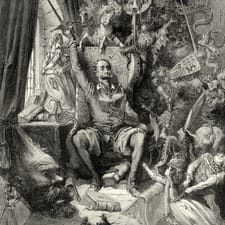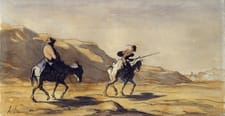Literature Was Never “Progressive”
Great literary texts do not fare well under the conditions of cultural revolutions.
By James Simpson
"A world of disorderly notions..." by Gustave Dore, 1863. Public Domain.
A graduating former student who was compiling a “life-reading list” recently asked me to contribute a shortlist of favorite books. Being asked the question sharpened my sense of what texts I love best: those that are inconsistent, undecided about the right side of history, and that are not dully, predictably progressive or reactionary. I love texts that resist the simplicities and repressions of cultural and political revolutions, whether those revolutions are produced by the right or the left.
Don Quixote (1605, 1615) tops my list. Cervantes’ novel (one of the first!) is apparently true to the English word “novel,” which derives, I don’t need to say, from Latin “novella,” meaning “new things.” And that’s how Don Quixote has been received for the most part: as pointing to the new. Mark Twain, ever the trenchant spokesperson for the new world of equality, crisply characterized the dominant strand of Cervantes-reception. With Don Quixote, Twain avers in his Life on the Mississippi (1883), Cervantes “swept the world's admiration for the mediaeval chivalry-silliness out of existence.”
The first instance of this take had in fact been no less trenchantly stated almost 300 years earlier by Cervantes himself. In the Prologue to Don Quixote, Cervantes favorably reports a friend saying that “this book of yours aims at no more than destroying the authority and influence which books of chivalry have in the world.” So, in Part 1.6, Don Quixote’s housekeeper has it right: she makes a big bonfire in the don’s courtyard and promptly gets to work tossing his books of chivalric romance into the flames. After the dominance of questionably idealistic chivalric romance for three centuries, the action makes plain that it’s time for some decisive canon reformation, making way for the world of anti-aristocratic, empirical reality. Time to light the bonfire. Back in the day we had knights saving damsels in distress, but now we’re done with that genre; a new day has begun. The novel is unequivocally on the side of modernity.
Literature addresses our situatedness as historical creatures; it prizes the past that has brought us to the promise of the present.
Or is it? Don Quixote himself is indeed hopelessly, comically absurd as he defies the hard-edged, disenchanted world of early modern Spain. But maybe the “new thing” of this novel also expresses protest of sorts against a modernity that has no place for the honor-bound world of chivalry. Cervantes’ rationalized, bureaucratized, increasingly centralized early modern Spain was the revolutionary modernity of the Holy Office of the Inquisition (including its book burnings), the expulsion of unconverted Jews and Muslims, legislated purity of blood requirements limiting access to government and ecclesiastical posts, and ethnic cleansing by the expulsion from Spain of all those with Muslim ancestry. Many of these repressive measures find muted but unmistakable and ominous echoes in the novel (see the housekeeper’s book burning!).
Don Quixote is in fact poised between worlds, looking backwards as it moves ineluctably forwards. Of course, enlightened criticism has words for the backward look that turns away from the home base of the novel (i.e. Reality) as a genre. Severe words like “escapism,” “sentimentalism,” and (the real knock-out) “nostalgia” warn us against the retro look, lest we succumb to multiple, inconsistent sympathies. Such words prohibit the experience of finding oneself in history, as they command a progressive, consistently forward-looking view.

Cultural revolutions repudiate multiple sympathies and equivocation, which is why they always institute their own form of book burning and reformulate a sanitized canon according to their pure dogma. It is no accident that the revolutionary philosopher Plato, in his reactionary Republic, should ban most literature from his ideal utopian society of pure Justice. Great literary texts (i.e., texts with multiple, often inconsistent cultural sympathies) do not fare well under the conditions of cultural revolutions. Instead, they forge liberties of their own out of those unresolved, inconsistent cultural sympathies.
Philosophy, by contrast, promises to guide our political choices, and yes, of course we must try to be enlightened and consistent in those applied, real-world political choices. Of course. Literature, however, disobediently refuses to conform to the standards of the cultural revolution. Literature addresses our situatedness as historical creatures; it prizes the past that has brought us to the promise of the present, even if we might ultimately feel obliged to reject that past. Literature is the Janus-faced discipline, drawing on the past to forge future liberties.
By the light of great literature, then, things were different back in the day. Without recognizing that difference, we can’t understand where we find ourselves now, or the route traversed to arrive here. The moment we apply the standards of a relentlessly revolutionary present to our past, we quickly end up rejecting most of that past.
By that very rejection, indeed, we may even ensure that the promising, utopian present stumbles immediately into repressive censorship. The longed-for present turns out not to be so progressive or loveable after all. From the evidence of some (most?) cultural revolutions, right or left, we might discover that the road to hell is paved with clear, unequivocal, apparently just philosophical consistencies.
Cultural revolutions repudiate multiple sympathies and equivocation, which is why they always institute their own form of book burning.
All great literature is equivocal. The light and energy produced by those equivocations define literary greatness. Literature works on a “back in the day” principle that implies that the past is a different if not wholly foreign country. Even Mark Twain comes around to such unabashed equivocation. His nom de plume is itself an imperative to see things from a double perspective (“mark twain!”). He follows the command in his time-travel novel A Connecticut Yankee in King Arthur’s Court (1889): Hank, a gunmaker, imports and imposes enlightened American modernity into and onto medieval Britain only to end up destroying medieval Britain in a murderous storm of technological terror. Hank comes from outside to introduce modernity, democracy, civilization, and equality, and to sweep “the mediaeval chivalry-silliness out of existence.”
Instead, however, he brings terrifying destruction. The equality he imports is most evidently the equality of indiscriminate, electrified death. Hank’s soldiers, victors in the final battle, will themselves die, killed by “the poisonous air bred by those dead thousands.” The conquerors, who deploy revolutionary violence in the name of utopia, end up contracting the virus of history against which they had tried to inoculate themselves. Clean breaks in history turn out to be not so clean.
We find ourselves, and seek to find ourselves, within the warring battles of revolutionary culture wars, wars prosecuted by both left and right. Those of us who care about literary liberties have an extraordinary opportunity. We can activate that reformist opportunity by looking, through literature, back in and on the day.
